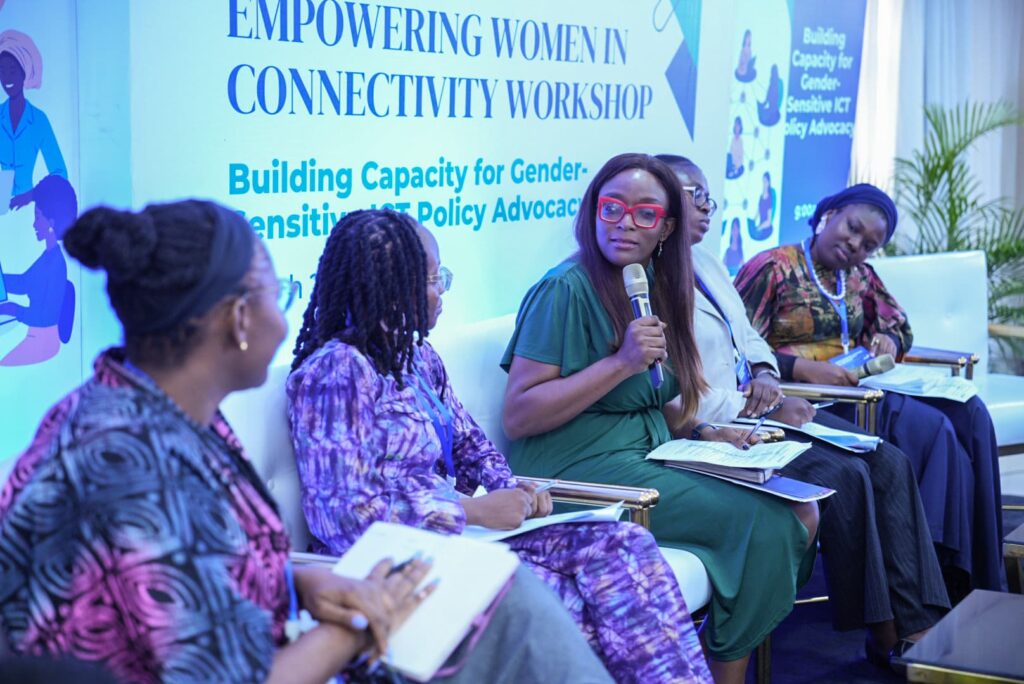As International Women’s Month draws to a close, TechSocietal hosted an insightful workshop titled Empowering Women in Connectivity – Building Capacity for Gender-Sensitive ICT Policies on March 25, 2025, at the Mulligan Hotel. This event brought into focus the urgent issue of women’s underrepresentation in ICT policymaking, aligning with TechSocietal’s mission to create a secure and inclusive digital world for the most vulnerable members of society.
The workshop sought to empower participants with the tools and knowledge needed to integrate gender-responsive ICT policies, fostering community-centered connectivity. Discussions centered on the persistent gender gap in access to and usage of Information and Communication Technologies (ICT).
According to GSMA’s The Mobile Gender Gap Report: 2024, only 33% of adult women in Nigeria have access to mobile internet. This disparity is driven by a variety of factors, including traditional gender roles, socio-cultural norms, economic inequalities, and limited access to education. These barriers not only impede women’s digital inclusion but also stunt national growth and development.
Bridging the Digital Divide: Why Women’s Inclusion Matters
Despite making up 49.44% of Nigeria’s population, women face significant digital exclusion, which has broader implications for the economy. Excluding over half of the population from technology which is an essential driver of economic growth, limits the nation’s potential. Reports also highlight stark gender gaps in internet access: 61.3% of men versus 39.8% of women in urban areas, and 25.5% of men versus 10.6% of women in rural regions. These numbers reflect not just a lack of access, but also unequal opportunities to harness technology for education, entrepreneurship, and community development.
Key Insights from the Workshop
- Gender-Neutral Policies Leave Women Behind
In the session ‘Understanding Gender & ICT Policy Gaps: Where Do Women Fit?’ facilitated by Adeboro Odunlami, Lawyer and Trust & Safety Consultant, participants examined the Nigerian National Broadband Plan (2020–2025). The discussion revealed that many of the existing policies are gender-neutral, unintentionally leaving women marginalized and failing to address systemic barriers women face. Women are often “projectized” where they are included in short-term initiatives but not integrated into long-term ICT strategies. This approach risks excluding women once these projects are over, further emphasizing the need for comprehensive, systemic inclusion within policy frameworks.
- Changing Mindsets: The Role of Community Networks
The panel session, ‘Women in Community Networks: Where are We Now?’ emphasized the need for both men and women to undergo reorientation and re-education about the importance of digital inclusion for women. It was noted that women, influenced by socio-cultural norms or a lack of awareness, may not fully appreciate the value of engaging with the digital world or the opportunities it can provide. Similarly, some men, influenced by traditional gender roles, may fail to recognize the value of women’s participation in the digital space, viewing technology as a predominantly male domain.
Changing these mindsets requires deliberate efforts to challenge stereotypes and raise awareness about the transformative power of digital inclusion. Re-educating women can empower them to see digital tools not only as essential for personal growth but as gateways to education, entrepreneurship, and active civic engagement. At the same time, reorienting men can help them become allies in fostering an environment where women are encouraged and supported to fully engage in the digital ecosystem.
This shift in perspective is vital for breaking down the systemic barriers that hinder women’s digital inclusion. Ultimately, the inclusion of women in the digital space will benefit not only individuals but entire communities and the nation as a whole, driving innovation, economic growth, and social progress.
Recommendations for an Inclusive Digital Future
To drive meaningful change, the following changes were proposed during the workshop:
- Integrate Gender-Responsive Frameworks: Policymakers must move beyond gender-neutral approaches and adopt gender-intentional ICT policies that address women’s unique barriers.
- Amplify Women’s Voices in Policy Design: Ensure women are not just beneficiaries but active contributors in shaping ICT strategies at all levels.
- Promote Digital Literacy & Reorientation Programs: Launch community-based initiatives to challenge stereotypes and empower women with digital skills as well as engage men in advocacy to foster supportive ecosystems.
- Adopt the Policy Assessment Checklist: Use this tool to audit existing policies, identify gaps, and advocate for inclusive alternatives.
- Invest in long-term Solutions, not just projects by shifting from short-term interventions to sustainable models that institutionalize women’s participation in ICT.
Conclusion
By adopting gender equity into ICT policies, we promote innovation, economic growth, and societal progress. We can learn from global best practices, adapting proven strategies to Nigeria’s context. Countries like Rwanda, Kenya, and India have made strides in digital inclusion through targeted policies, grassroots education, and public-private partnerships. To close the digital gender gap, we must take deliberate and sustained action.
